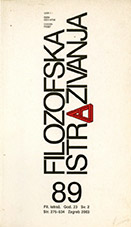Koliko razuma ima kod Descartesa?
How Many Types of Reasons are there in Descartes?
Between Reason, Will and Senses in Descartes
Author(s): Adriana ZaharijevićSubject(s): Metaphysics, Epistemology, Early Modern Philosophy, Philosophy of Mind
Published by: Hrvatsko Filozofsko Društvo
Summary/Abstract: The text is seeking to delve into and expose different types and veiled meanings of reasons in Descartes' philosophy. As is usually conceived, whether epistemologically or metaphysically, there is no more than one dualism in Descartes: the dualism between body and mind. In the process of meditative discourse, however, there seems to be some hierarchical grading of what is habitually called reason/mind. Since he managed to »smuggle« the so-called »pure« reason by virtue of the uncontestable faith in reason, lumen naturale, he needed to construct and substantiate such a thing that would in all possible manners be distinguishable from the corporeal. Creating an insurmountable gap between these two, Descartes despondently yearned to bridge it (throughout his entire philosophy), thus constituting a new one, seldom apprehended, duality. That is, the fundamental duality between »pure« reason, the »unmixed« holder of the eternal truths and innate ideas, the subject of cogito, and sensus communis, the pineal gland, the fleshy site where the soul resides. This duality is crucial to understanding of Cartesian dualism, as he himself appeared to have solved it by dint of it. This text, therefore, aims to be an exegesis, though not the resolute one, of the given problem.
Journal: Filozofska istraživanja
- Issue Year: 23/2003
- Issue No: 02
- Page Range: 379-406
- Page Count: 28
- Language: Croatian

